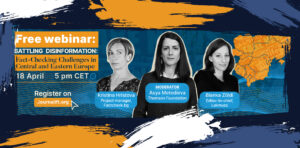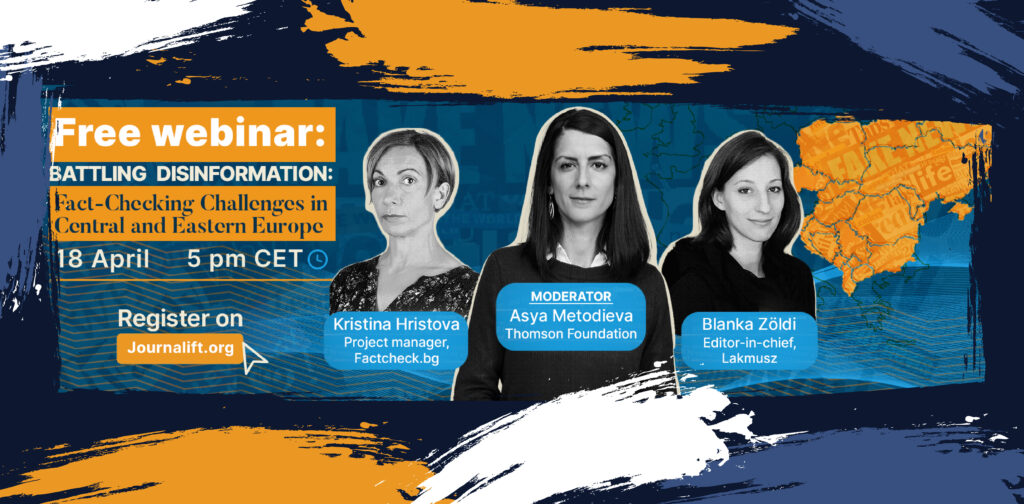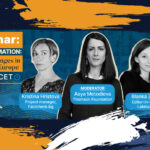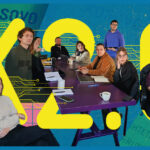For decades, the media in our region, struggling to survive, have been divided into those that “find their way” and those who “struggle to make it”. Those who are affiliated with parties in power are usually able to “find their way”, and those who are not – “are struggling to make it”. When the government changes, and that doesn’t happen very often, the roles change. Those who have been founding their way, will now have to struggle to make it and vice versa. Of course, there are those who are always able to find their way, aligned with every government, as well as the few of them that are sentenced to life imprisonment.
Well, this is the story of RTV Puls from Šilovo in Kosovo and they belong to the latter group. Of course, most of you have never heard of Šilovo, one of the three largest Serb-populated villages in Kosovsko Pomoravlje. Honestly, neither did I, until I met Slavko, Nenad and all those hard-working and wonderful people who have been struggling to make it for more than twenty years, who became part of the "Media for All" project of the Thomson Foundation. When I say the largest village, I mean just over 1,200 people, and those twenty or so employees of RTV Puls make this media outlet the largest employer in the municipality. And not only that. Thanks to the regional license, the program of this television can be watched outside the Gjilan region, in all neighbouring municipalities, and through the networks of cable operators it can be watched by almost everyone in Kosovo. Which, of course, isn’t the case.
RTV Puls is what it is. A local RTV station trying to help its neighbours. The story of the origin of this RTV station can be found here. During my thirty years long experience of working in the media, I met the owners of dozens of local media in the region. Pretty much all of their stories begin the same way. A family starts a business, usually from their home, they invest their savings in it, everyone does everything and sooner or later they have to find the answer to the question: How can this survive? The answer is usually: It’s difficult. It’s more difficult for the radio than for the portal, it’s more difficult for the newspapers than for the radio, and it’s more difficult for the television than for the newspapers.

That is why the story of RTV Puls is interesting. Their studio is no longer based in their family home. Technically, they look better than many larger and well-known televisions, the ones you've probably heard of. I was drawn to their project, which was to produce five shows from five Kosovo municipalities over five months, in which those municipalities would present their cultural, tourist and business offer, and viewers would learn something about Novo Brdo, Klokot or Ranilug, for example. It wouldn’t be unusual even for a local television if it was to be recorded, but RTV Puls wanted to do it all during a live broadcast, in front of the audience and - with its own REPORTING CARS.
I couldn't believe what I was reading. How come a TV station from Šilovo has a reporting car? Now, five months after the shows were produced, I can say that I was honoured to be able to help the realization of this unique project at least a bit. You can watch the show "Eto nas kod vas" here, and I asked Nenad Milenković (born in 1985), a young owner and director of RTV Puls, who took over the job from his recently deceased father, to share the story of this vehicle with you.
"The initial idea for the reportage car came up as a joke in 2012 between me and editor Stanko Pevac" - Milenković begins his story. "We wanted to make a power-on vehicle for our needs. We did that with a small amount of money and existing equipment, we designed and built a small pickup vehicle for live streams, and that's how it was for a year or two."
"However, we didn’t stop there. Whether out of ambition or madness, I was persuaded to design and make something bigger for 4-camera transmissions. Of course, we dismantled the pickup and made a bigger vehicle in the then WW van."
It should be noted here that Nenad has graduated from the Faculty of Electrical Engineering in Niš in 2008 and then returned to Šilovo to help run the television.
"In the first year, we worked with the new vehicle only for our own needs. However, Božur Fest was organized, which was supposed to be broadcast by RTS, but due to problems with the transfer of equipment across the border, they asked us to do it commercially for them. We were hesitant to do it thinking it would be a big project for us, but we said yes after being pressured... and we did it and proved we can do it. After that, for each new broadcast from Kosovo, RTS has hired us, because we were a small and a functional team. We were cheaper than the hotels that they would have to pay for their staff."
"The story goes on, the requirements begin to be more and more complex and then I decide to expand the car to six cameras. Then we buy a new, bigger vehicle and we start it all over again. We are dismantling the old, adapting the new, renewing the equipment and starting the implementation of new, more complex shows."

"After that, Pink has heard of us, so they hired us for Žikina šarenica show," Milenković continues his story. "We have done as much as we could, but as technology progresses, customers start having new requirements. Realizing that, and not only that but also the requirements that exceed my engineering capabilities, I made the decision to buy a dedicated vehicle from the BBC. The adaptation of the vehicle was entrusted to one of the best companies in the world for OB VAN. Although the jobs were periodic, I calculated and figured out that the vehicle could repay the loan instalment. Two months have passed from making a decision to its realization. We have bought a professional vehicle. It was arranged according to the BBC standard, so some technical adaptations had to be made to meet our working conditions. The vehicle was adapted by Miloš Stepić, RTS’ head of reportage cars. When the vehicle arrived to Belgrade, the news was quickly spread among people in the business. Demand offers began to come in, mostly for sporting events. We were also contacted by Telekom and United Media. However, sport events require different cameras and lenses as opposed to, for example, concerts. We are now looking for a solution for the purchase of funds for the purchase of cameras and sports replay systems, which amounts to some 200,000-250,000 euros."
Nenad and I are now looking at that picture of a pickup truck with a cameraman on the roof from the beginning of this story. It wasn't that long ago. Oh, if only the situation in Kosovo would change like a reportage car of RTV Puls.
"Apart from those owned by the state RTK media company, our cars are much more advanced than are those of the Albanian media. Other media do not have their own cars, but they rent them from external productions. So they also rented our previous cars. So far, we have done around one hundred events, but the biggest ones that I would like to mention are: Božur Fest (4 days), RTS Symphony Orchestra in Gračanica, Neverne bebe’s, concert of Svetlana Ceca Ražnatović, Žikina šarenica, Trumpet Festival in Guča and the most complex one in my opinion - the Century of the Winner from the military range Međa that we did for RTS. As our people would say, parallel to their cars, because that event was done in synchronization with several reportage cars and from several locations, and all these broadcasts were broadcast on national televisions in Serbia."

And what now, Nenad, how to proceed? - I ask him at the end.
"The advantage of our reportage car is that it’s the most modern version within the OBV class with up to ten cameras. The small team is needed for it, and therefore it’s cheap."
"When choosing a vehicle, I considered the needs of the market. I could have bought a big truck and do big events like Eurovision, but it’s a one event and who knows when would another such opportunity show up. I opted for ten cameras, so that I could do all the sporting events, concerts and election rallies. With as few people as possible to be able to make the cheapest deals, which is crucial today. The prices of similar services in the EU are at least twice as high. So far, all the events have been mostly done by our employees, but they haven’t done sports, and that is something we could focus on in the coming period. That is why I am already gathering a team in Belgrade that could help them. If we get contracts with Telekom or United Media, it would not only ensure the functioning of reportage car, but would also solve the problem of financing RTV Puls. You will never live from advertisements here. There is no work or money. It’s simply a reality. That's why our business with reportage cars is our future on wheels."
I hope you now understand what the "struggling to make it" phrase from the beginning of this story means. What started as a joke in 2012 could turn into a serious business. Larger than the small village of Šilovo in Gjilan municipality with just over 1,200 inhabitants.































